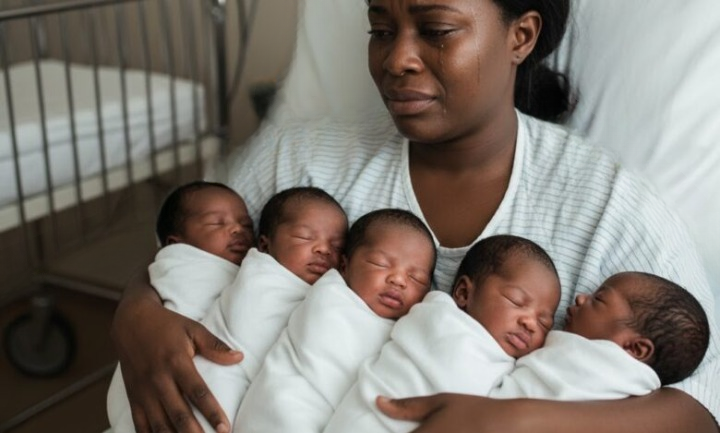The maternity ward buzzed with the unmistakable sound of new life—five tiny cries weaving together in a wild, beautiful symphony. Nurses hurried from incubator to incubator, adjusting blankets, checking oxygen levels, soothing restless limbs. In the middle of it all lay a young mother, pale with exhaustion, staring in awe at the five newborns she had just brought into the world. Quintuplets. Small. Fragile. Perfect.
She had imagined sharing this moment with her partner—his hand in hers, both of them overwhelmed with pride. Instead, the shift in the room began the second he stepped toward the crib.
He stopped cold.
His expression didn’t soften. It hardened, contorting into something sharp and ugly.
“They… they’re Black,” he murmured, each word punctured with disbelief, accusation simmering beneath it.
The mother blinked up at him, still hazy from labor. “They’re our babies,” she whispered. “They’re yours.”
But he jerked back as if she had burned him. Fury twisted his features.
“No. No, they’re not mine. You cheated on me.”
Before she could even form the words to defend herself, he turned and walked out. No goodbye. No questions. Not even a glance at the five infants he’d already decided weren’t his.
He never came back.
That night, as the ward finally quieted, she held each baby to her chest, whispering the same vow into tiny, warm ears: “If others leave, you stay. You’re mine. And I’ll protect you.”
Her world changed in an instant. Raising one child alone is a challenge. Raising five without support, savings, or community compassion? It was like climbing a mountain barefoot. But she never hesitated. She threw herself into motherhood with grit instead of self-pity.
She took every job she could get: scrubbing offices long after midnight, mending clothes before sunrise, counting coins to stretch grocery money. Some weeks, she barely slept. But her children never felt her struggle. She shielded them from it with fierce love.
The world wasn’t so generous.
People whispered behind her back. Strangers stared openly in public. Landlords shut doors on her. Some asked cruel questions about her “choices.” Others wondered loudly who the “real father” was. She learned to tune it out, no matter how deeply the comments cut. Every night, she repeated the same truth to her children: “We may not have much, but we have each other. That’s more than enough.”
The kids grew up holding that truth like a shield. They were five different personalities—five different storms of determination. Their home was cramped, cluttered with hand-me-down furniture, and overflowing with love.
One child built things and eventually became an architect. Another devoured books and grew into a lawyer who never backed down from a fight. A third had a voice that drew crowds—a singer destined for stages. Another had a strategic mind and became a sought-after consultant. The fifth painted their way into the art world with bold colors and bolder dreams.
They didn’t grow up privileged. They grew up relentless.
But the world never stopped doubting them.
“Are you sure you know who your father is?” people would sneer.
“Are you sure your mother wasn’t hiding something?”
The children ignored it for years. But eventually, the burden became too heavy.
“We’re taking a DNA test,” one sibling announced. “Not because we doubt Mom. Because we want to end this once and for all.”
They agreed. They wanted the truth written in science, not whispered in rumors.
When the results finally arrived, they opened the envelope together—five grown children sitting around the same worn secondhand table their mother bought decades ago.
The truth hit instantly.
Their mother had never lied.
The man who abandoned them was their biological father. Without question. Without ambiguity.
But one question lingered: How did two white parents have five Black children?
The answer lay in genetics.
Doctors explained that both parents carried rare recessive pigmentation traits—silent genes passed down from ancestors. Hidden. Dormant. Until suddenly, in this generation, they surfaced all at once.
Not infidelity. Not betrayal.
Science.
When the truth rippled through the community, the whispers evaporated. People who once judged their mother now avoided her gaze. Those who doubted her felt shame burn hot in their stomachs.
But she never gloated. She wasn’t that person. She had carried the truth quietly for thirty years without bitterness. She didn’t need vindication.
Her children were all the proof she’d ever needed.
When they brought her the DNA results, she didn’t break down. She simply nodded.
“I already knew,” she said softly. “And I knew you trusted me. That was enough.”
But to them, it meant everything. They hugged her with a tenderness shaped by decades of watching her fight battles alone. She had endured racism, abandonment, poverty, judgment—and still raised five unstoppable adults.
Thirty years ago, a frightened young man ran from the truth because he didn’t understand it. Three decades later, science delivered the clarity he never had.
This story isn’t just about genetics. It’s about the damage assumptions can cause… the blindness of prejudice… and the indestructible strength of a mother standing alone against the world.
She didn’t just raise five children.
She raised five living testaments to resilience, truth, and unshakeable dignity.
And while the man who doubted them disappeared into a quiet, forgettable life, she became something far greater:
The mother who refused to break.
